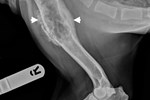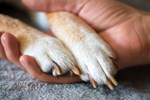Search - Research
361 - 370 of 452 results
-
UK falls out of puppy-love with Westies
The discovery is surprising given that the breed, which is well-known for its dense white coat and cheeky face, has been a multiple Crufts winner and featured in various long-running advertising campaigns. -
New evidence for health-related welfare prioritisation of canine disorders
The RVC's VetCompass™ programme have investigated the severity and duration of the major conditions seen in practice in addition to recording their frequency to provide an overall measure of welfare impact -
A Very big dog problem: New study identifies alarming bone cancer risk in giant dogs
New research from the Royal Veterinary College has shed light on the frequency and risk factors associated with osteosarcoma bone cancer in dogs in the UK New research from the Royal Veterinary College (RVC) has revealed the frequency and risk … -
New study highlights concerns over the purchasing of flat-faced dogs
Owners are attracted by their large, wide-set eyes, and flat faces, even though these characteristics are linked with a variety of inherited diseases.The popularity of flat faced brachycephalic dogs in the UK continues to rise.
The French Bulldog …
-
RVC advanced medical imaging centre set to strengthen Hertfordshire’s life sciences capability
The RVC has been awarded a £2.13 million Getting Building Fund grant from Hertfordshire Local Enterprise Partnership (LEP) to create a Cardiovascular Imaging Centre of Excellence (C-ICE) in the countyThe Royal Veterinary College (RVC) has been awarded a £2.13 million Getting Building Fund grant …
-
New research highlights high risk of ear and eye disease in English Cocker Spaniels in the UK
New research from the Royal Veterinary College (RVC) VetCompass™ programme has found that English Cockers Spaniels have an increased risk of disorders such as ear discharge, dry eye and musculoskeletal pain, but have reduced risk of allergies, … -
New research from the RVC reveals reasons for antibiotic usage in Indian chicken farming
New research from the Royal Veterinary College (RVC), in collaboration with the West Bengal University of Animal & Fishery Sciences (WBUAFS), explored antibiotic use in chicken farming in eastern India, revealing how poultry companies play a …New research from the Royal Veterinary College (RVC), in collaboration with the West Bengal …
-
New research from the RVC lifts the lid on dog breeds suffering from abnormal eyelids
A new study from the Royal Veterinary College’s (RVC) VetCompass Programme has revealed the scale of serious welfare issues associated with dog breeds that have abnormal eyelid positioning that many people still consider as ‘normal for the breed’. … -
New research from the RVC reveals how boredom can manifest in animals
A new study from the Royal Veterinary College (RVC) has revealed that sensory monotony can induce boredom-like behaviour in rats, as happens in humans. These findings could have implications for animal training, animal welfare, and for understanding …A new study from the Royal Veterinary College (RVC) has revealed that sensory monotony can induce …
-
New RVC study reveals novel insights into nail clipping in dogs in the UK
A new study by the Royal Veterinary College (RVC) VetCompass Programme has revealed that nail clipping in dogs in the UK is a highly common procedure and recommends additional training and education to further support veterinarians and owners to …






.jpg?v=638497412905269457)



